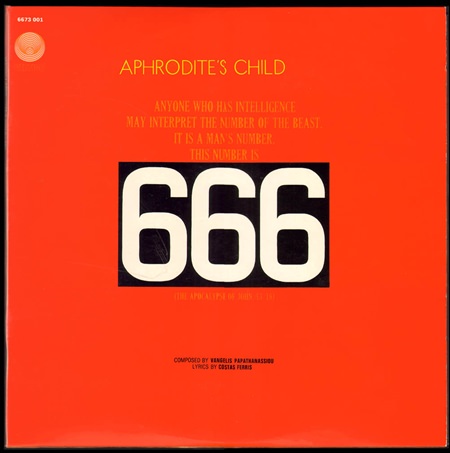 Aphrodite’s Child: 666 (Vertigo)
Aphrodite’s Child: 666 (Vertigo)
Heavily bearded fatsos create a Greek prog rock classic based on the Apocalypse and bag a contract with the coolest label of them all, Vertigo. Great stuff. Except for the fact that this prog rock classic almost wasn’t released at all due to a track called “Infinity”, which sounds unmistakingly like a woman’s five-minute struggle to achieve an orgasm; her moans and shivers fired up by some hot percussion work.
Please Support Pattaya Mail
When the album finally hit the stands, the band had already broken up. Demis Roussos had gone up five kaftan sizes, ate women for breakfast and was establishing a new career as a torch singer for unstable ladies who fainted easily, while Vangelis, who had only gone up three kaftan sizes, continued his prog rock crusade quite successfully, becoming some sort of a cult hero before he crossed over into the movies by delivering the soundtracks to some very popular and famous films – and befriending Jon Anderson on the way.
It was indeed Vangelis’ musical ambitions that blew Aphrodite ‘s Child apart. The other guys would much rather be pop stars and perform the simpler stuff (they had a huge international hit in 1968 with “Rain And Tears”, remember).
“666” was a difficult beast to deal with. They did not like it. But Vangelis got his way, and today the album is hailed as one of the first prog rock masterpieces ever. It focuses on a scary topic: Doomsday, the end of the world – leaning heavily on the Apocalypse as told in “The Revelations of John”, the last book of the New Testament. But the beauty of the music belies the album’s lyrical darkness. The music is like the ebb and flow of the ocean, rising and falling as it moves through bombastic peaks and tender whispers, never losing its melodic qualities. There are some exceptions, though, “Infinity” being one of them.
The lyrics are quite clever too, wide open for interpretations, they are both timeless and connected to contemporary (at the time) issues like the Vietnam War and the student riots in Europe and the US. Not many would’ve guessed that Demis Rousson took part in that turbulent phase in rock music and youth culture. But then one forgets that Greece was the cradle of Western civilization, and there certainly must have been stranger sights around than cribs containing huge babies with angelic voices.
“666” has been called “the Sgt. Pepper of the underworld”.
Released: June 1972
Produced by: Vangelis Papathanassiou
Side One
1. “The System” 0:23
2. “Babylon” 2:47
3. “Loud, Loud, Loud” 2:42
4. “The Four Horsemen” 5:53
5. “The Lamb” (Instrumental) 4:34
6. “The Seventh Seal” 1:30
B1. “Aegian Sea” 5:22
2. “Seven Bowls” 1:28
3. “The Wakening Beast” (Instrumental) 1:11
4. “Lament” 2:45
5. “The Marching Beast” (Instrumental) 2:00
6. “The Battle of the Locusts” (Instrumental) 0:56
7. “Do It” 1:44
8. “Tribulation” (Instrumental) 0:32
9. “The Beast” 2:26
10. “Ofis” 0:14
Side Three
1. “Seven Trumpets” 0:35
2. “Altamont” 4:33
3. “The Wedding of the Lamb” (Instrumental) 3:38
4. “The Capture of the Beast” (Instrumental) 2:17
5. “”” (Infinity) 5:15
6. “Hic and Nunc” 2:55
Side Four
1. “All the Seats Were Occupied” 19:21
2. “Break” 2:59
Band Musicians:
Vangelis (Evangelos Odysseas Papathanassiou): keyboards, organ, piano, vibraphone, bass, flute, percussions, backing vocals (“Lament”, “The Beast”, “Break”)
Demis Roussos (Artemiros Ventouris Roussos): lead vocals (on “Babylon”, “The Four Horsemen”, “Hic et Nunc”), backing vocals, bass, guitar
Lucas Sideras: lead vocals on “The Beast”, “Break”, backing vocals, drum kit, snare drums
Silver Koulouris (Anargyros Koulouris): guitar, baritone guitar, percussions
Guest Musicians:
Harris Halkitis: bass, tenor saxophone, congas, percussions, drums, snare drums, background vocals
Michel Ripoche: trombone, tenor saxophone (on “Babylon”, “Hic et Nunc”)
Irene Papas: vocals (on “””)
John Forst: vocals (English text narration)
Yannis Tsarouchis: vocals (Greek text narration)
Daniel Koplowitz: vocals (on “Loud Loud Loud”)
Lyricist:
Costas Ferris
 |
 |
 |





